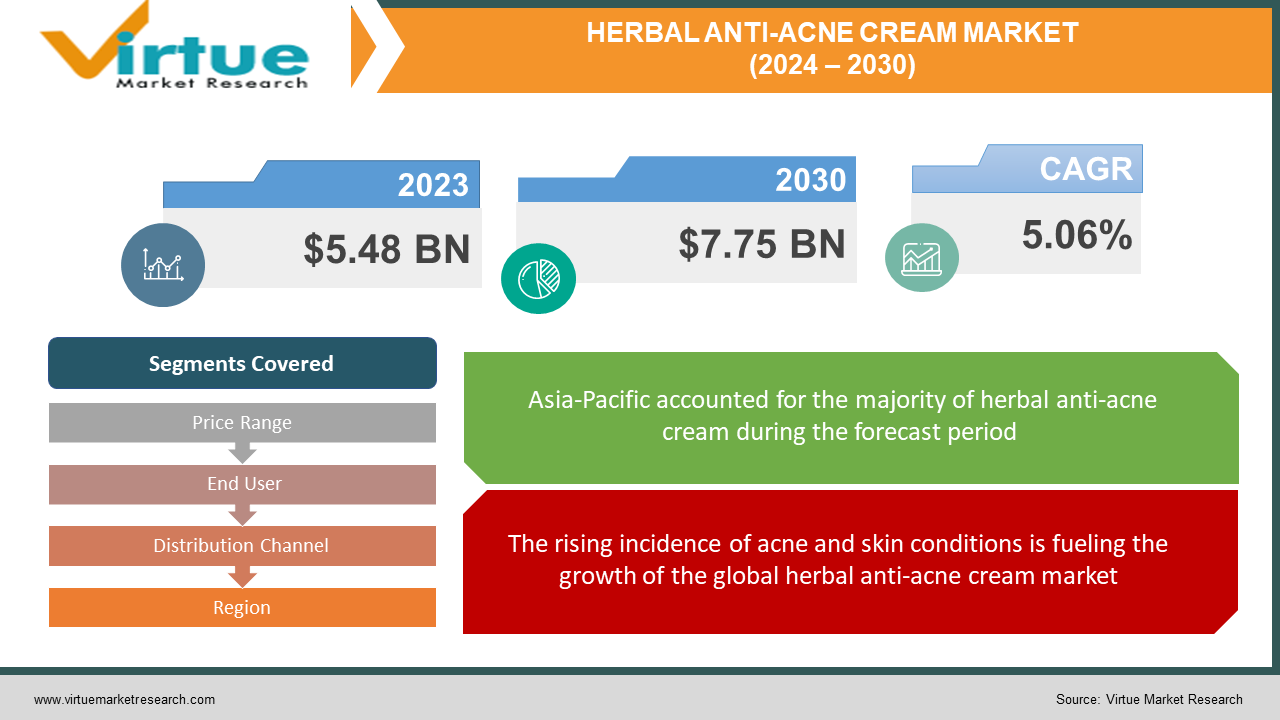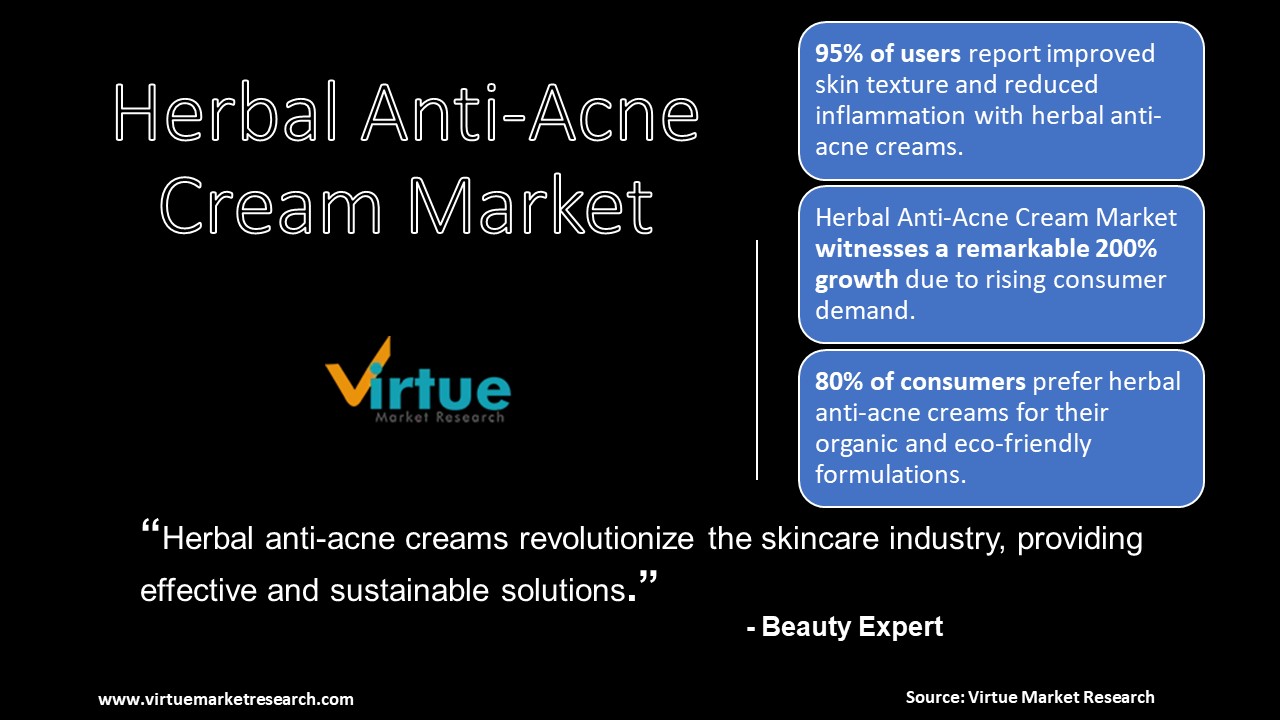Herbal Anti-Acne Cream Market Size (2024 - 2030)
The global Herbal Anti-Acne Cream Market is estimated to be worth USD 5.48 Billion in 2023 and is projected to reach a value of USD 7.75 Billion by 2030, growing at a CAGR of 5.06% during the forecast period 2024-2030.
The popularity of herbal cosmetics has grown owing to their potential to improve general health and appearance. Both men and women acknowledge the importance of appearance, and throughout history, the concept of beauty and cosmetics has played a substantial role. Derived from the Greek word "kosmtikos," meaning the skill of decoration, cosmetics utilize various herbal ingredients to provide specific cosmetic benefits. By harnessing the nourishing and healing properties of herbs like leaves, bark, berries, and flowers, herbal cosmetics offer individuals the opportunity to showcase their natural beauty and unique personality. The appeal of herbal cosmetics lies in their effectiveness, acceptance, and avoidance of adverse effects commonly associated with synthetic alternatives, leading to their increasing popularity in the market. Ayurveda acknowledges the benefits of utilizing herbs and flora in cosmetics to enhance beauty and protect against external factors. Natural botanical-based cosmetics provide essential nutrients and minerals without causing harm. Indian herbs play a crucial role in the formulation of an array of everyday goods, comprising oils, shampoos, conditioners, soaps, and face washes. Herbal cosmetics are entirely natural, free from harmful chemicals, and promote healthy skin. They are tested rigorously by Ayurvedic specialists, are hypoallergenic, ideal for all skin types, and do not need animal testing, making them cruelty-free. These cosmetics are also free from parabens and offer a diverse selection of affordable products to cater to various needs.
Global Herbal Anti-Acne Cream Market Drivers:
The rising incidence of acne and skin conditions is fueling the growth of the global herbal anti-acne cream market.
Acne affects people globally, causing skin issues like pimples and lesions. The utilization of herbal anti-acne creams is growing owing to increased awareness and the rising number of individuals with acne. It is the 8th most prevalent disease worldwide, impacting approximately 700 million individuals or 10% of the global population. Acne, while not life-threatening, may result in psychological issues such as depression and anxiety. Recently, there has been a rise in men utilizing herbal anti-acne creams as they become more aware of the benefits. This trend has prompted companies to manufacture specialized herbal anti-acne creams for men, leading to the introduction of innovative products in the market. Therefore, this factor drives the demand for herbal anti-acne cream.
The increasing popularity of plant-based skin-care products is another factor contributing to the growth of the global herbal anti-acne cream market.
Growing global concerns regarding synthetic ingredients in skin care products are prompting consumers to shift towards plant-based alternatives. This shift is propelling the growth of the herbal anti-acne cream market, as consumers seek innovative and health-beneficial skin-care products. This demand has led to an increased interest in natural ingredients sourced from various countries. Notably, South Korea is known for the yuzu citrus fruit, Australia for the Kakadu plum, and Indonesia and Malaysia for rambutan. Therefore, this factor also drives the demand for herbal anti-acne cream.
Global Herbal Anti-Acne Cream Market Challenges:
The global herbal anti-acne cream market is encountering challenges, primarily in terms of the increasing presence of counterfeit products. The rise in counterfeit products has detrimental effects on the growth of the herbal anti-acne cream market and creates hardships for genuine herbal product brands in domestic and international markets. The widespread existence of counterfeit makeup products across various countries underscores the seriousness of the issue within the industry. This situation poses challenges for authentic herbal product brands as they strive to establish their presence and protect their market position.
Global Herbal Anti-Acne Cream Market Opportunities:
Market expansion strategies present a lucrative opportunity in the global herbal anti-acne cream market. Given the rising demand for herbal anti-acne creams owing to their advantages, including lower risk of side effects, suitability for all skin types, cruelty-free, and budget-friendly, businesses specializing in the production and distribution of herbal anti-acne cream can stand to gain significantly from this opportunity by expanding their products to emerging markets.
COVID-19 Impact on the Global Herbal Anti-Acne Cream Market:
The outbreak of the COVID-19 pandemic substantially impacted the global herbal anti-acne cream market. The pandemic caused disruptions in supply chains and distribution of goods and services, which highly affected the production and distribution of herbal anti-acne creams. Moreover, the demand for herbal anti-acne creams declined due to the financial uncertainty for many consumers created by the pandemic, which lead to a decrease in discretionary spending. These factors negatively impacted the growth of the global herbal anti-acne cream market. Despite these challenges, the global herbal anti-acne cream market is projected to recover and grow in the coming years.
Global Herbal Anti-Acne Cream Market Recent Developments:
-
In March 2023, Lotus Herbals Pvt. Ltd. unveiled the expansion of its men's facial product range with an emphasis on targeted remedial solutions. They also plan to incorporate technology to meet the rising demand for personalized beauty.
-
In December 2020, Amway India expanded its presence in the herbal skincare market with the launch of the Attitude Herbals Insta Nourish Range. This new range offers effective herbal products with indigenous ingredients, pleasant sensory experiences, appealing formats, and visually appealing packaging. Amway aims to meet the demands of its discerning customers by providing natural and attractive skincare options that align with their preferences.
HERBAL ANTI-ACNE CREAM MARKET REPORT COVERAGE:
|
REPORT METRIC |
DETAILS |
|
Market Size Available |
2022 - 2030 |
|
Base Year |
2022 |
|
Forecast Period |
2023 - 2030 |
|
CAGR |
5.06% |
|
Segments Covered |
By Price Range, End User, Distribution Channel and Region |
|
Various Analyses Covered |
Global, Regional & Country Level Analysis, Segment-Level Analysis, DROC, PESTLE Analysis, Porter’s Five Forces Analysis, Competitive Landscape, Analyst Overview on Investment Opportunities |
|
Regional Scope |
North America, Europe, APAC, Latin America, Middle East & Africa |
|
Key Companies Profiled |
Himalaya Wellness Company (India), Vicco Laboratories (India), Lotus Herbals Pvt. Ltd. (India), Amway (United States), Patanjali Ayurved Limited (India), Jovees Herbal Care India Ltd. (India), Herbalife International, Inc. (United States), Khadi Natural Healthcare (India), Forest Essentials (India), Ozone Ayurvedics (India), Omnipotent S Pharmaceuticals (India) |
Global Herbal Anti-Acne Cream Market Segmentation: By Price Range
-
Mass
-
Premium
In 2022, the mass segment accounted for the highest market share. The growth can be attributed to the advantages that mass herbal anti-acne creams offer in contrast to premium products, including affordability, wide availability, alignment with consumer preferences, inclusivity, and response to growing demand. Mass-market herbal anti-acne creams offer budget-friendly options that cater to price-conscious consumers. They are extensively distributed through various retail outlets, reaching a larger audience. These products meet the needs of consumers who prioritize affordability and value for money without compromising quality. Mass-market brands also focus on inclusivity, appealing to diverse customer bases.
Global Herbal Anti-Acne Cream Market Segmentation: By End User
-
Men
-
Women
In 2022, the women segment held the largest market share. The growth can be attributed to women experiencing acne more often than men owing to hormonal changes, making them more likely to seek remedies such as herbal anti-acne creams. They have a greater interest in skincare and actively seek solutions for maintaining clear skin. The beauty industry targets women, offering a wide range of skincare products tailored to their needs, increasing awareness and usage of herbal anti-acne creams. Societal pressure and beauty standards emphasizing flawless skin contribute to the higher demand among women.
Global Herbal Anti-Acne Cream Market Segmentation: By Distribution Channel
-
Supermarkets/Hypermarkets
-
Specialty Stores
-
E-commerce
-
Others
In 2022, the specialty stores segment held the highest market share. The growth can be attributed to the exclusive selection of herbal products offered by specialty stores, which assists in attracting customers specifically seeking herbal and organic options. Knowledgeable staff provides personalized assistance, guiding customers to choose products that align with their preferences. Additionally, specialty stores build trust and reputation by offering high-quality, cruelty-free, and ethical products. Customers who prioritize herbal products trust and prefer these stores.
Global Herbal Anti-Acne Cream Market Segmentation: By Region
-
North America
-
Europe
-
Asia-Pacific
-
South America
-
Middle East & Africa
In 2022, the region of Asia-Pacific held the largest share of the global herbal anti-acne cream market and will continue to expand at the quickest rate over the forecast period. The growth can be attributed to the rising awareness regarding the benefits of utilizing herbal products, the growing demand for healthier and eco-friendly skincare options, the stringent safety regulations that instilled consumer trust in the quality and safety of herbal products, and the rise of veganism, particularly among millennials. In addition, the region is home to several significant market players, including Himalaya Wellness Company, Vicco Laboratories, Lotus Herbals Pvt. Ltd., Patanjali Ayurved Limited, and Jovees Herbal Care India Ltd.
Global Herbal Anti-Acne Cream Market Key Players:
-
Himalaya Wellness Company (India)
-
Vicco Laboratories (India)
-
Lotus Herbals Pvt. Ltd. (India)
-
Amway (United States)
-
Patanjali Ayurved Limited (India)
-
Jovees Herbal Care India Ltd. (India)
-
Herbalife International, Inc. (United States)
-
Khadi Natural Healthcare (India)
-
Forest Essentials (India)
-
Ozone Ayurvedics (India)
-
Omnipotent S Pharmaceuticals (India)
Chapter 1. Herbal Anti-Acne Cream Market – Scope & Methodology
1.1. Market Segmentation
1.2. Assumptions
1.3. Research Methodology
1.4. Primary Sources
1.5. Secondary Sources
Chapter 2. Herbal Anti-Acne Cream Market – Executive Summary
2.1. Market Size & Forecast – (2023 – 2030) ($M/$Bn)
2.2. Key Trends & Insights
2.3. COVID-19 Impact Analysis
2.3.1. Impact during 2023 - 2030
2.3.2. Impact on Supply – Demand
Chapter 3. Herbal Anti-Acne Cream Market – Competition Scenario
3.1. Market Share Analysis
3.2. Product Benchmarking
3.3. Competitive Strategy & Development Scenario
3.4. Competitive Pricing Analysis
3.5. Supplier - Distributor Analysis
Chapter 4. Herbal Anti-Acne Cream Market - Entry Scenario
4.1. Case Studies – Start-up/Thriving Companies
4.2. Regulatory Scenario - By Region
4.3 Customer Analysis
4.4. Porter's Five Force Model
4.4.1. Bargaining Power of Suppliers
4.4.2. Bargaining Powers of Customers
4.4.3. Threat of New Entrants
4.4.4. Rivalry among Existing Players
4.4.5. Threat of Substitutes
Chapter 5. Herbal Anti-Acne Cream Market - Landscape
5.1. Value Chain Analysis – Key Stakeholders Impact Analysis
5.2. Market Drivers
5.3. Market Restraints/Challenges
5.4. Market Opportunities
Chapter 6. Herbal Anti-Acne Cream Market - By Price Range
6.1 Mass
6.2 Premium
Chapter 7. Herbal Anti-Acne Cream Market - By End User
7.1 Men
7.2 Women
Chapter 8. Herbal Anti-Acne Cream Market - By Distribution Channel
8.1 Supermarkets/Hypermarkets
8.2 Specialty Stores
8.3 E-commerce
8.4 Others
Chapter 9. Herbal Anti-Acne Cream Market - By Region
9.1 North America
9.2 Europe
9.3 Asia-Pacific
9.4 Rest of the World
Chapter 10. Herbal Anti-Acne Cream Market - Key Players
10.1 Himalaya Wellness Company (India)
10.2 Vicco Laboratories (India)
10.3 Lotus Herbals Pvt. Ltd. (India)
10.4 Amway (United States)
10.5 Patanjali Ayurved Limited (India)
10.6 Jovees Herbal Care India Ltd. (India)
10.7 Herbalife International, Inc. (United States)
10.8 Khadi Natural Healthcare (India)
10.9 Forest Essentials (India)
10.10 Ozone Ayurvedics (India)
10.11 Omnipotent S Pharmaceuticals (India)
Download Sample
Choose License Type
2500
4250
5250
6900
Frequently Asked Questions
The Global Herbal Anti-Acne Cream Market is estimated to be worth USD 5.22 Billion in 2022.
The Global Herbal Anti-Acne Cream Market Drivers are the rising incidence of acne and skin conditions and the increasing popularity of plant-based skin-care products.
Based on the End User, the Global Herbal Anti-Acne Cream Market is segmented into Men and Women.
India is the most dominating country in the region of Asia-Pacific for the Global Herbal Anti-Acne Cream Market.
Himalaya Wellness Company, Vicco Laboratories, and Lotus Herbals Pvt. Ltd. are the leading players in the Global Herbal Anti-Acne Cream Market.





